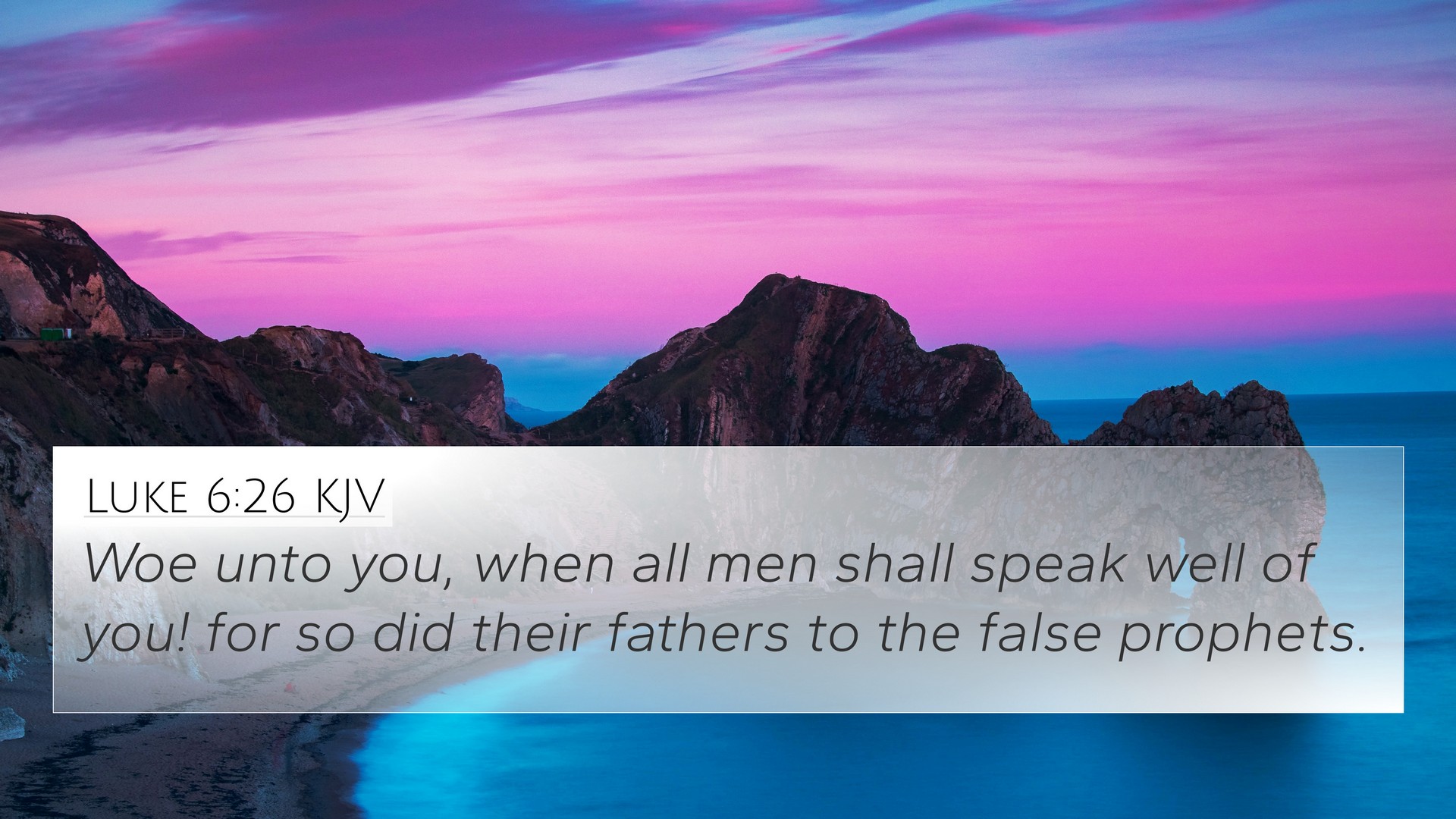Understanding Luke 6:26: Insights from Public Domain Commentaries
Luke 6:26 states, "Woe to you when all men speak well of you, for that is how their ancestors treated the false prophets." This verse serves as a stark warning about the nature of approval and reputation, particularly highlighting the potential dangers of seeking honor and praise from society versus finding favor with God.
Summary of Meaning
In this verse, Jesus contrasts the blessings and woes of His followers with the actions of those who disregard divine warnings. The verse implies that the favor of humanity often equates to the disfavor of God, particularly when those praises arise from misleading or false teachings.
Key Insights from Commentaries
Several prominent biblical commentators provide valuable insight into this passage:
- Matthew Henry: Henry emphasizes that seeking the world’s approval is misguided. He identifies the danger of desiring to be liked by men, likening such desire to the deception of the false prophets who were celebrated for their pleasing messages rather than the truth.
- Albert Barnes: Barnes interprets “woe” as a declaration of impending judgment. He notes that receiving universal praise often indicates a departure from righteousness, suggesting that believers may face persecution and hardship as a result of their faithfulness to God's truth.
- Adam Clarke: Clarke expands on the historical context, noting that false prophets were celebrated while true prophets faced rejection. He urges believers to evaluate the significance of their reputation before men compared to their standing before God.
Key Themes and Applications
The central theme of Luke 6:26 is the dichotomy between human approval and divine truth. Here are a few thematic implications:
- Contrasting Values: True believers may often face opposition and should not seek validation from those who might uphold falsehoods.
- Enduring Faith: This verse encourages believers to remain steadfast in their faith, regardless of human praise or condemnation.
- Divine Judgment: The focus on how men treated false prophets serves as a cautionary tale of divine judgment awaiting those who prioritize their image over spiritual integrity.
Cross-References and Thematic Connections
Luke 6:26 contains various connections to other biblical texts. Here are several verses that relate to its themes:
- Matthew 5:11-12: "Blessed are you when others revile you and persecute you..." This echoes the idea of being persecuted for righteousness.
- John 15:19: Jesus mentions that if the world hates you, know that it has hated me before it hated you.
- Jeremiah 5:31: Highlights how false prophets are treated favorably whereas true prophets are often rejected.
- 1 Thessalonians 2:4: Apostles speak not to please men, but God who tests hearts, reinforcing the need for divine approval over human accolades.
- Isaiah 30:10: A text in which the people desired to hear smooth things, showcasing the human tendency to prefer pleasing messages over truthful ones.
- Luke 11:47: References the building tombs for prophets while rejecting their messages showcases how society treats true messengers.
- Proverbs 29:25: Fear of man lays a snare, but whoever trusts in the Lord is safe; reminds readers of the potential dangers in seeking human approval.
- 2 Timothy 4:3-4: Describes a time when people will not endure sound teaching, preferring teachers that suit their own passions.
- James 4:4: Affirms friendship with the world as enmity with God, linking back to the idea of seeking human connection over divine alignment.
Exploring the Cross-References
Understanding the connections between these verses allows for deeper insight into biblical themes:
- By analyzing Matthew 5:11-12 alongside Luke 6:26, one can discern the blessings attached to persecution versus the woes of worldly approval.
- Examining the warnings in John 15:19 regarding the world's hatred serves as a reminder of the cost of discipleship.
- The parallels between Jeremiah 5:31 and Luke 6:26 illustrate historic patterns of rejecting God’s true messengers while applauding those who lie.
Tools for Bible Cross-Referencing
For those interested in engaging with the richness of scripture through a cross-referential lens, there are several resources available:
- Bible Concordance: To locate specific terms and their occurrences throughout scripture.
- Bible Cross-Reference Guide: Offers thematic links across different books of the Bible.
- Cross-Reference Bible Study: Techniques for connecting passages during personal study.
Conclusion
In conclusion, Luke 6:26 serves as an important reminder about the nature of true faithfulness versus the superficial approval of the world. By cross-referencing this verse with others, a more comprehensive understanding of the intended messages about righteousness, persecution, and divine judgment can be achieved.
This approach not only aids in developing a deeper relationship with the Scriptures but cumulatively enriches one’s study through cross-referencing biblical texts and exploring thematic connections.


















